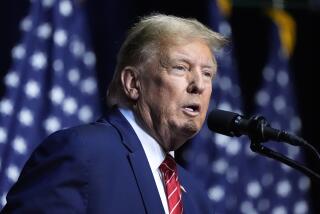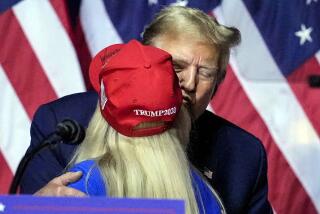A whole new Romney for 2012 presidential run
Defying his reputation as a 1950s square, the new, more casual Mitt Romney is popping up around the country as he readies a second run for president. He’s going tieless on network TV, strolling NASCAR pits in Daytona and sporting skinny Gap jeans bought for him by his wife.
His latest campaign book, just out in paperback, opens with a regular-guy scene: wealthy Mitt in a Wal-Mart checkout line, buying gifts for his grandsons and comparing the surroundings to Target, another discount store he says he’s familiar with.
The image tweaks are part of a broader makeover as Romney prepares to run from what should be an enviable spot: He’s the early Republican favorite — though far from an inevitable nominee.
The former Massachusetts governor will start out with valuable presidential campaign experience from his 2008 try, and a deeper financial network than his Republican rivals. The national economic debate plays to his background as an investment executive and “gives him a big advantage,” said Carl Forti, a former top advisor.
Yet for every edge, there are drawbacks. Taken together, they make Romney an unusually weak front-runner.
One of his biggest problems is “a suspicion that he is not as authentic as voters would like and he doesn’t connect as well with voters as they would like,” said Whit Ayres, a Republican pollster not aligned with any candidate. “Politicians who are viewed as authentic have a much easier time connecting with the voters they are wooing. People like Ronald Reagan and [New Jersey Gov.] Chris Christie seem to have no trouble connecting, in part because they seem so comfortable in their skin.”
The problem has been fed by the fact that, in each of his runs for public office, Romney has remade himself. Last time out, he shed his moderate social views on abortion and gay rights, then struggled to convince primary voters of his conservative bona fides. A perception grew that the handsome candidate, with his almost-too-perfect hair and teeth and seemingly scripted answers to every question, would say anything to get elected.
Meantime, religious conservatives, uneasy with his devout Mormon beliefs, failed to warm to his candidacy — and that remains a problem, particularly in Southern primaries.
In 2008, he had “no overarching theme to answer the question, ‘Why should I vote for Mitt Romney?’” said an advisor, requesting anonymity to discuss his candidate’s prospects candidly. Romney’s campaign book, “No Apology: Believe in America,” attempts to frame an answer around a theme of national greatness.
If 2012 were a typical nomination campaign, Romney’s status as the establishment favorite would play to his advantage in the nomination contest. But today’s GOP is consumed by anti-establishment fervor. Energy in the Republican primaries is likely to be pulsing from fired-up “tea party” backers, and Romney will face fierce competition for their support from more-conservative rivals.
His most serious new challenge involves an issue that wasn’t a major factor last time: “Romneycare,” the Massachusetts healthcare plan he signed into law in 2006. It features a provision just like the one that has conservatives outraged over President Obama’s plan — a government mandate that requires virtually everyone to purchase medical insurance or pay a penalty.
“I still think he has to explain the Massachusetts healthcare law in terms that will satisfy the conservative base in the party, and I think that’s a tall order,” said former Rep. Vin Weber, policy chairman of Romney’s 2008 campaign, who is supporting fellow Minnesotan Tim Pawlenty this time.
Romney defends his Massachusetts creation by arguing that applying a mandate nationwide, as Congress has done, violates states’ rights guaranteed under the 10th Amendment of the Constitution.
But few outside the Romney camp think a legalistic explanation will satisfy conservatives fed up with what they see as excessive government power.
In his most high-profile appearance so far this year, at a conservative convention in Washington, Romney never mentioned his healthcare plan. His remarks, bashing Obama, were in line with a cautious strategy designed to minimize unforced errors.
A formal candidacy announcement from Romney would be a technicality; for months, he has been quietly lining up support from insiders and big fundraisers, while successfully limiting media exposure. His visits to key primary states often take place in private and without advance notice. He declined an interview for this article through his press secretary, Eric Fehrnstrom, who said Romney wasn’t scheduling newspaper or magazine interviews at this time.
Tonight, Romney will raise his profile with his first public appearance since last fall in New Hampshire, the first primary state.
His moves so far have been aimed at correcting a flaw from 2008: peaking before it mattered. In both Iowa and New Hampshire, he built — and lost — early leads. “The one thing I learned from the last campaign I ran is that we got in too early,” he told Hugh Hewitt, among the conservative radio hosts he has cultivated.
A stealth campaign has worked to his advantage up to now, helping him dodge the intense scrutiny that is a front-runner’s curse. When he told CNN’s Piers Morgan, at the height of the pro-democracy uprising in Cairo, that he would “avoid the term dictator” in describing Egyptian President Hosni Mubarak, Romney received none of the attention Vice President Joe Biden got five days earlier for the same eyebrow-raising remark.
Romney, who turns 64 this month, has streamlined his campaign organization, by reducing the number of voices in the inner circle and shifting his longtime aide and 2008 campaign manager, Beth Myers, out of an operational role. He isn’t planning to spend his personal fortune the same way he did last time, when he seeded his candidacy with more than $42 million of his own money. But with a net worth of at least $190 million, he can always dip into his own pocket.
As for doubts about authenticity, Romney is counting on the electorate being less concerned with past inconsistencies than in picking a candidate who can turn the economy around. Brushing aside a question from CNN’s Morgan about his tendency to flip-flop, Romney said, “People in America want to know who can get 15 million people back to work.”
More to Read
Get the L.A. Times Politics newsletter
Deeply reported insights into legislation, politics and policy from Sacramento, Washington and beyond. In your inbox three times per week.
You may occasionally receive promotional content from the Los Angeles Times.






